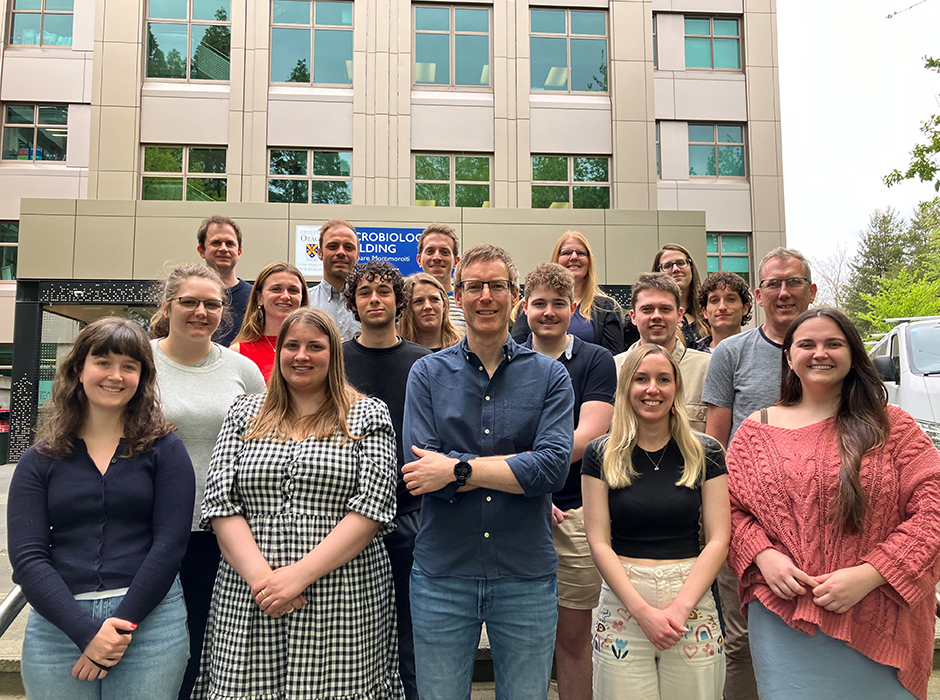
The Department of Microbiology and Immunology Phage-host interactions (Phi) laboratory, winners of this year’s Otago Research Group Award. Pictured back from left is, Simon Jackson, Jeremy Dubrulle, Nils Birkholz, Nicola Marechal, Leah Smith. Middle row: Natalie Kyte, Ella Redmond, Timothé Malaterre, Susie Warring, Joel Haste, George Warren, David Mayo-Muñoz, Rob Fagerlund. Front: Megan McLeod, Shaharn Cameron, Peter Fineran, Kate Harding, Holly Wakelin. Absent: Hazel Sisson.
A combination of innovation and teamwork has earned the Department of Microbiology and Immunology Phage-host interactions (Phi) laboratory the 2024 Otago Research Group Award.
Professor Peter Fineran is thrilled that the award recognises the international standard of work his lab is doing in this innovative area.
It is also testament to the team approach.
“We have a strong skillset and a good team culture – I put a lot of value into having a team that works well,” Peter says.
“This award is a nice way to highlight our emerging researchers as individuals in their own right, but who together are contributing on the world stage. We’re collectively delighted.”
The Phi lab has 19 members and draws on a range of expertise across genetics, microbiology, biochemistry, structural biology, bioinformatics and chemistry.
Several senior team members, including Dr Simon Jackson, Dr Leah Smith, Dr Rob Fagerlund, Dr Suzie Warring and Dr Nils Birkholz have their own funded studies that make important contributions to the overall research direction of the Phi lab.
Peter also notes the work Nicola Marechal does to manage the laboratory.
“Without her support our lab would fall apart.”
Phages are viruses that infect and specifically kill bacteria – they are the most abundant organism on the planet. Studies are focusing on exactly how they destroy bacteria, and also to understand the interactions that help bacteria resist phages and how phages then evolve to overcome that resistance.
Understanding that fundamental biology will help develop better and safer methods to control bacteria across health and agriculture – as an anti-microbial alternative to traditional antibiotics, and for more sustainable bacterial controls in primary production.
Phage research has been around for some time, but it’s ramped up in recent years given resistance to antibiotics is a huge and growing problem across the world. Phage resistance mechanisms discovered in bacteria – such as CRISPR-Cas – also have huge biotechnological potential.
“There is a strong push to come up with effective alternatives for treating infections. Phages are naturally occurring, and they have amazing diversity, so it makes sense for us to look at ways of harnessing their potential,” he says.
Peter has run his group at Otago for the last 16 years. His team are well respected for their world-leading discoveries. For example, they have had two publications in Nature in the last year alone and he has presented at several leading conferences over the last few months.
Peter’s team has done innovative work recently on understanding CRISPR as a resistance for stopping bacterial invasion and discovered new ways that phages can overcome CRISPR.
Their ability to attend prestigious overseas events and visit institutes has built up valuable international relationships and collaborations.
“For our size, I believe we’re punching above our weight in our targeted contributions to the global research effort.”
Kōrero by Claire Grant, Communications Advisor, School of Biomedical Sciences